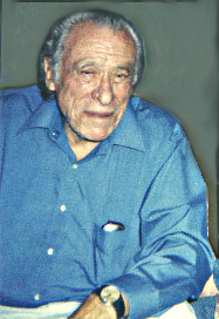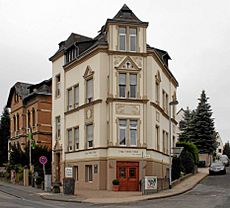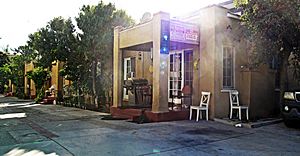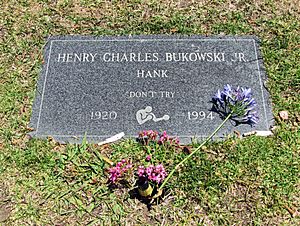Charles Bukowski facts for kids
Quick facts for kids
Charles Bukowski
|
|
|---|---|

Charles Bukowski in 1988
|
|
| Born | Heinrich Karl Bukowski August 16, 1920 Andernach, Rhineland-Palatinate, Germany |
| Died | March 9, 1994 (aged 73) San Pedro, Los Angeles, U.S. |
| Occupation | Novelist, poet, short story writer, columnist |
| Nationality | German-American |
| Literary movement | Dirty realism, Transgressive fiction |
Henry Charles Bukowski (boo-KOW-skee; born Heinrich Karl Bukowski August 16, 1920 – March 9, 1994) was an American writer. He wrote many poems, novels, and short stories. His writing often showed the everyday lives of ordinary people in Los Angeles.
Bukowski started publishing his work in the early 1940s. He wrote thousands of poems and hundreds of short stories. He also wrote six novels. During his life, he published over sixty books.
He was not very well-known by critics in the USA. But he was more popular in Europe, especially in the UK and Germany, where he was born.
Contents
Charles Bukowski: A Writer's Life
Early Life and Challenges
Charles Bukowski was born Heinrich Karl Bukowski in Andernach, Germany. His father was an American soldier of German background. He stayed in Germany after World War I.
Bukowski's parents met in Andernach. His family moved to Los Angeles in 1930. His father often did not have a job.
Young Bukowski spoke English with a German accent. Other children made fun of him. He was shy and did not like being around people. This got worse when he was a teenager. The Great Depression made him feel angry. This anger later became a big part of his writing.
After high school, Bukowski went to Los Angeles City College. He studied art, journalism, and literature for two years. He left college when World War II started. Then he moved to New York City. He hoped to become a writer while working blue-collar jobs.
In 1944, Bukowski was arrested by the FBI. They thought he was trying to avoid joining the army. He was held for seventeen days. Later, he failed a mental health test. He was then declared unfit for military service.
Starting His Writing Journey
When Bukowski was 24, his short story "Aftermath of a Lengthy Rejection Slip" was published. Two years later, another story came out. But he found it hard to get his work published. He stopped writing for almost ten years. These "lost years" later became stories in his books. He often wrote about his life using a character named Henry Chinaski.
During this time, he lived in Los Angeles. He worked odd jobs and stayed in cheap rooms. In the early 1950s, he worked as a letter carrier for the post office. But he quit before working there for three years.
In 1955, Bukowski had a serious illness. After leaving the hospital, he started writing poetry. That same year, he married a poet named Barbara Frye. They divorced in 1958.
Some of Bukowski's poems were published in the late 1950s. A small magazine called Nomad published his early work. In 1960, Nomad also published one of his well-known essays.
A New Chapter: Full-Time Writer
By 1960, Bukowski was back at the post office in Los Angeles. He worked as a letter filing clerk for over ten years. In 1962, he was very sad when his first serious girlfriend, Jane Cooney Baker, died. He wrote many poems and stories about her death.
In 1960, his first separate publication came out. It was a broadside (a single sheet of paper) called "His Wife, the Painter." Later that year, his first small book of poems, "Flower, Fist and Bestial Wail," was published.
In 1964, his daughter, Marina Louise Bukowski, was born. Her mother was Frances Smith.
In 1969, Bukowski got an offer from Black Sparrow Press publisher John Martin. He decided to quit his post office job to write full-time. He was 49 years old. He said he would rather "starve" as a writer than stay at the post office. Less than a month after quitting, he finished his first novel, Post Office. He published most of his later major books with Black Sparrow Press.
In 1976, Bukowski met Linda Lee Beighle. She owned a health food restaurant. Two years later, he moved to San Pedro. Beighle followed him. They lived together and later married in 1985. Linda Lee Beighle is called "Sara" in his novels Women and Hollywood.
In the 1980s, Bukowski worked with cartoonist Robert Crumb. Bukowski wrote the stories, and Crumb drew the pictures for comic books. Crumb also illustrated some of Bukowski's stories in the 1990s.
His Final Years and Lasting Impact
Bukowski died on March 9, 1994, in San Pedro. He was 73 years old and had leukemia. He finished his last novel, Pulp, just before he died. He is buried in Green Hills Memorial Park.
In 2006, Bukowski's writings were given to the Huntington Library. Copies of all his books from Black Sparrow Press are at Western Michigan University.
New collections of his poems are still being released. These come from thousands of works published in small magazines.
What Influenced His Writing?
Many writers influenced Bukowski's style. Some of them include John Fante, Knut Hamsun, Louis-Ferdinand Céline, Ernest Hemingway, and Henry Miller.
Bukowski often said that Los Angeles was his favorite topic. He felt a strong connection to the city. He said he couldn't imagine living anywhere else.
Bukowski also gave live readings of his works. He started on a radio station in 1962. He did more readings through the 1970s.
His Books and Poems
Novels
- 1971 – Post Office
- 1975 – Factotum
- 1978 – Women
- 1982 – Ham on Rye
- 1989 – Hollywood
- 1994 – Pulp
Poetry Collections
- Flower, Fist, and Bestial Wail (1960)
- It Catches My Heart in Its Hands (1963)
- Crucifix in a Deathhand (1965)
- At Terror Street and Agony Way (1968)
- Poems Written Before Jumping Out of an 8-story Window (1968)
- A Bukowski Sampler (1969)
- The Days Run Away Like Wild Horses Over the Hills (1969)
- Fire Station (1970)
- Mockingbird Wish Me Luck (1972)
- Burning in Water, Drowning in Flame: Selected Poems 1955–1973 (1974)
- Maybe Tomorrow (1977)
- Love Is a Dog from Hell (1977)
- Play the Piano .. Like a Percussion Instrument Until the Fingers Begin to Bleed a Bit (1979)
- Dangling in the Tournefortia (1981)
- War All the Time: Poems 1981–1984 (1984)
- You Get So Alone at Times That It Just Makes Sense (1986)
- The Roominghouse Madrigals (1988)
- Septuagenarian Stew: Stories & Poems (1990)
- People Poems (1991)
- The Last Night of the Earth Poems (1992)
- Betting on the Muse: Poems and Stories (1996)
- What Matters Most Is How Well You Walk Through the Fire. (1999)
- Open All Night (2000)
- The Night Torn Mad with Footsteps (2001)
- Slouching Toward Nirvana (2005)
- The Continual Condition (2009)
- On Cats (2015)
- On Love (2016)
- Storm for the Living and the Dead (2017)
Short Stories
- Confessions of a Man Insane Enough to Live with Beasts (1965)
- South of No North (1973)
- Hot Water Music (1983)
- Bring Me Your Love (1983)
- Tales of Ordinary Madness (1983)
- The Most Beautiful Woman in Town (1983)
- Portions from a Wine-stained Notebook: Short Stories and Essays (2008)
- The Bell Tolls For No One (CityLights, 2015 edition)
Nonfiction Books
- Shakespeare Never Did This (1979); expanded (1995)
- The Captain Is Out to Lunch and the Sailors Have Taken Over the Ship (1998)
- On Writing Edited by Abel Debritto (2015)
- The Mathematics of the Breath and the Way: On Writers and Writing Edited by David Stephen Calonne (City Lights, 2018)
See also
 In Spanish: Charles Bukowski para niños
In Spanish: Charles Bukowski para niños
 | Laphonza Butler |
 | Daisy Bates |
 | Elizabeth Piper Ensley |




